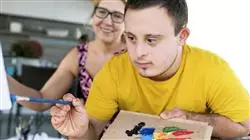University certificate
With this Practical Training you will take a definitive step in your career.”
Introduction to the Program
With this innovative practical learning modality, you will incorporate to your professional practice the most advanced strategies for the approach of infectious, inflammatory and/or autoimmune diseases of the infant nervous system"

Until a few years ago, diseases such as epilepsy, hydrocephalus or infantile cerebral palsy were crippling for the pediatric patient who suffered from them. However, current scientific and technological advances have made all these pathologies more manageable, providing the child with a better quality of life. Another proof of this are the discoveries related to infectious, inflammatory and/or autoimmune diseases of the nervous system. From sophisticated strategies of recent implementation, pharmacological procedures and other therapeutic alternatives have been found to counter these conditions. Moreover, in the surgical field, there are now much more efficient strategies that favor the preservation of brain tissue through implants and other devices.
At the same time, neuro-pediatricians are not always aware of how to apply these new advantages because, in the educational market, programs with a high theoretical load prevail. However, TECH wants to set itself apart from other qualifications by offering the specialist a new academic modality.
This is how this Internship program in Pediatric Neurology and Neurodevelopment arises, based on a 3-week intensive face-to-face stay. During this learning process, the health professional will move to a medical facility, specialized in this health discipline and equipped with the latest technological and clinical resources. In addition, specialists have the opportunity to choose the facility that best suits their geographic location and pedagogical improvement interests.
Throughout the program, TECH will provide the student with the advice of an assistant tutor. This figure has been appointed to accompany the student in the development of practical skills and to incorporate the most avant-garde procedures of the moment into their practice. In addition, the neuro-pediatrician will have the opportunity to work and dialogue with other experts in order to gather as much experience as possible.

A unique training experience, key and decisive to boost your professional development"
Why study at TECH?
TECH is the world’s largest online university. With an impressive catalog of more than 14,000 university programs available in 11 languages, it is positioned as a leader in employability, with a 99% job placement rate. In addition, it relies on an enormous faculty of more than 6,000 professors of the highest international renown.

Study at the world's largest online university and guarantee your professional success. The future starts at TECH”
The world’s best online university according to FORBES
The prestigious Forbes magazine, specialized in business and finance, has highlighted TECH as “the world's best online university” This is what they have recently stated in an article in their digital edition in which they echo the success story of this institution, “thanks to the academic offer it provides, the selection of its teaching staff, and an innovative learning method aimed at educating the professionals of the future”
A revolutionary study method, a cutting-edge faculty and a practical focus: the key to TECH's success.
The most complete study plans on the university scene
TECH offers the most complete study plans on the university scene, with syllabuses that cover fundamental concepts and, at the same time, the main scientific advances in their specific scientific areas. In addition, these programs are continuously being updated to guarantee students the academic vanguard and the most in-demand professional skills. In this way, the university's qualifications provide its graduates with a significant advantage to propel their careers to success.
TECH offers the most comprehensive and intensive study plans on the current university scene.
A world-class teaching staff
TECH's teaching staff is made up of more than 6,000 professors with the highest international recognition. Professors, researchers and top executives of multinational companies, including Isaiah Covington, performance coach of the Boston Celtics; Magda Romanska, principal investigator at Harvard MetaLAB; Ignacio Wistumba, chairman of the department of translational molecular pathology at MD Anderson Cancer Center; and D.W. Pine, creative director of TIME magazine, among others.
Internationally renowned experts, specialized in different branches of Health, Technology, Communication and Business, form part of the TECH faculty.
A unique learning method
TECH is the first university to use Relearning in all its programs. It is the best online learning methodology, accredited with international teaching quality certifications, provided by prestigious educational agencies. In addition, this disruptive educational model is complemented with the “Case Method”, thereby setting up a unique online teaching strategy. Innovative teaching resources are also implemented, including detailed videos, infographics and interactive summaries.
TECH combines Relearning and the Case Method in all its university programs to guarantee excellent theoretical and practical learning, studying whenever and wherever you want.
The world's largest online university
TECH is the world’s largest online university. We are the largest educational institution, with the best and widest online educational catalog, one hundred percent online and covering the vast majority of areas of knowledge. We offer a large selection of our own degrees and accredited online undergraduate and postgraduate degrees. In total, more than 14,000 university degrees, in eleven different languages, make us the largest educational largest in the world.
TECH has the world's most extensive catalog of academic and official programs, available in more than 11 languages.
Google Premier Partner
The American technology giant has awarded TECH the Google Google Premier Partner badge. This award, which is only available to 3% of the world's companies, highlights the efficient, flexible and tailored experience that this university provides to students. The recognition as a Google Premier Partner not only accredits the maximum rigor, performance and investment in TECH's digital infrastructures, but also places this university as one of the world's leading technology companies.
Google has positioned TECH in the top 3% of the world's most important technology companies by awarding it its Google Premier Partner badge.
The official online university of the NBA
TECH is the official online university of the NBA. Thanks to our agreement with the biggest league in basketball, we offer our students exclusive university programs, as well as a wide variety of educational resources focused on the business of the league and other areas of the sports industry. Each program is made up of a uniquely designed syllabus and features exceptional guest hosts: professionals with a distinguished sports background who will offer their expertise on the most relevant topics.
TECH has been selected by the NBA, the world's top basketball league, as its official online university.
The top-rated university by its students
Students have positioned TECH as the world's top-rated university on the main review websites, with a highest rating of 4.9 out of 5, obtained from more than 1,000 reviews. These results consolidate TECH as the benchmark university institution at an international level, reflecting the excellence and positive impact of its educational model.” reflecting the excellence and positive impact of its educational model.”
TECH is the world’s top-rated university by its students.
Leaders in employability
TECH has managed to become the leading university in employability. 99% of its students obtain jobs in the academic field they have studied, within one year of completing any of the university's programs. A similar number achieve immediate career enhancement. All this thanks to a study methodology that bases its effectiveness on the acquisition of practical skills, which are absolutely necessary for professional development.
99% of TECH graduates find a job within a year of completing their studies.
Internship Program in Pediatric Neurology and Neurodevelopment
Pediatric neurology and neurodevelopment are fields of medicine that focus on understanding and addressing neurological disorders and conditions in children. This branch of medicine is critical to ensure the healthy growth and development of young children, as any alteration in the nervous system in these early stages can have a significant impact on their long-term quality of life. In order to provide health professionals with the necessary tools and knowledge to efficiently address the neurological challenges faced by children, TECH Global University has developed a complete Internship Program in Pediatric Neurology and Neurodevelopment. This program will provide practical strategies for the management of pediatric neurological conditions, including epilepsy, movement disorders, autism spectrum disorders, developmental delay, and learning disorders.
The program will provide practical strategies for the management of pediatric neurological conditions, including epilepsy, movement disorders, autism spectrum disorders, developmental delay, and learning disorders.
Specialize in pediatric neurology and neurodevelopment
This TECH Internship Program is your best opportunity to enter the field in a dynamic and practical way. With our methodology, you will approach the development of practical cases, which will allow you to enhance your skills in the performance of assigned functions. In addition, you will have lessons taught in a highly prestigious clinical center, where you will reinforce your practice in areas such as anatomical and physiological fundamentals of the developing nervous system and the diagnosis or treatment of common neurological disorders in childhood. In addition, you will learn to recognize neurodevelopmental milestones and evaluate potential abnormalities in children of different ages. With this background, you will be adept at performing a comprehensive neurological evaluation, interpreting relevant diagnostic tests, and developing individualized treatment plans.







